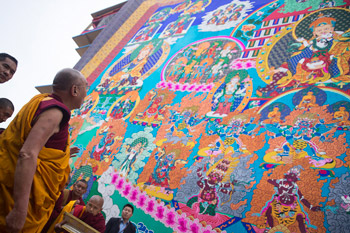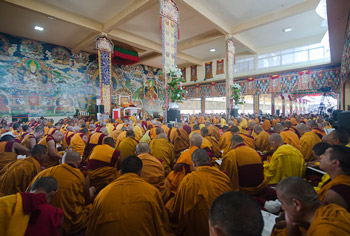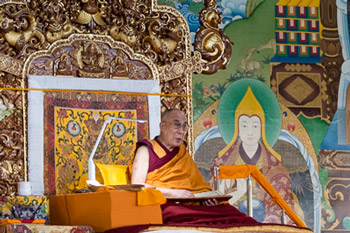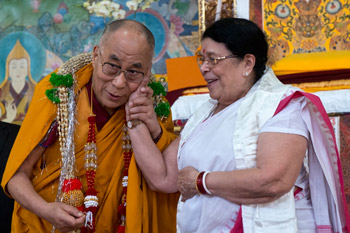Bylakuppe, Karnataka, India, 29 December 2013 - The morning sky over Bylakuppe was mistier as His Holiness the Dalai Lama left Sera Mey Monastery this morning. On arrival at Sera Jey he was greeted by the sight of a kyigu, a huge appliqué thangka of Guru Padmasambhava hanging down the front of a building. Asked to perform a brief consecration, he recited the necessary verses and cast handfuls of rice and flower petals over the lower part of the thangka.

|
His Holiness the Dalai Lama looking at a huge appliqué thank of Guru Rinpoche hanging from Sera Jey Monastery as he arrives for the fifth day of his teaching in Bylakuppe, Karnataka, India on December 29, 2013. Photo/Tenzin Choejor/OHHDL
|
Once again, following the recitation of the Heart Sutra, a group of newly qualified Geshes lined up to receive their certificates from Sharpa Chojey and then gathered round the foot of the throne to have their photograph taken with His Holiness.
A small group of Mongolians made an offering of the mandala and three representations of the body, speech and mind of enlightenment. Afterwards His Holiness found a copy of a prayer he had composed for the swift return of Kalkha Jetsun Dhampa Rinpoche on his table and wanted to know who was distributing it. This prompted him to explain that he had known Jetsun Dhampa since he was about 10 years old.
“He had gone to Mongolia and when I met him there he was quite weak and unwell. I told him he should consider taking rebirth in Mongolia again. Later, he sent me a message to enquire where and when he should pass away; an unusual request. I told him it would be better if he were to pass away in Mongolia, but that it would also be better not to do it before Losar, the New Year. And so it turned out. He passed away a few days into the New Year. I sent Samdhong Rinpoche as my representative to offer a scarf before the body. However, before he arrived, Ozer Rinpoche sent me a message to say there were indications of red bodhichitta and asking what they should do. I said, “Wait”. Samdhong Rinpoche duly arrived, offered the scarf and Rinpoche finished his meditation.
“This prayer refers to his previous lives and makes the wish that he come back in Mongolia as a scholar able to teach. It says, ‘Through the power of the blessings of the Three Jewels and with the support of Palden Lhamo, we pray for your return.”

|
Some of the many thousands of monastics listening to His Holiness the Dalai Lama speaking at Sera Jey Monastery in Bylakuppe, Karnataka, India on December 29, 2013. Photo/Tenzin Choejor/OHHDL
|
His Holiness explained that he had been born near Xining and Kumbum and the people of that area were closer to Jetsun Dhampa than to the Dalai Lamas. His parents were close to him. Later, in Lhasa when he went to visit his mother, he found Jetsun Dhampa with her. He said he’d known him since then and that he’d been dedicated to the welfare of the people and the Dharma.
“After Mongolia became free once more, I formally recognised and enthroned him where he lived in Madhya Pradesh. Amongst other things he was particularly supportive and helpful to me over the Dolgyal issue. At the request of the Jonangpas and others, remembering our friendship, I composed this prayer for his swift return.”
“For all those of us who follow Gautama Buddha, his vast and profound teachings remain relevant and necessary now in the 21st century,” His Holiness asserted. “Compassion and non-violence are common to the message of all religions, but what makes Buddhism unique is its view of dependent origination. Je Rinpoche said no one with intelligence could find fault with it.”
Monastics following in the Buddha’s footsteps have left the householder’s life. They need to make this opportunity worthwhile by doing spiritual practice within the context of the Four Noble Truths. Suffering is experienced, but its cessation is also taught. If you harm others you suffer; if you help them you experience happiness. These consequences arise as a result of an undisciplined and a disciplined mind respectively.
“No sentient being wants suffering. Suffering occurs because of ignorance, which can be overcome by developing the right knowledge. ‘I pay homage to you Shakyamuni Buddha, who taught the holy Dharma, who taught what you have seen. Following you, I’ll be able to surmount all shortcomings.’ It’s not just that the Buddha taught this and we’re following it, we need to apply reason to understand it. Some people base their spiritual practice on faith alone, but a Buddhist should base his or her faith on reason.

|
His Holiness the Dalai Lama speaking during the fifth day of his teachings at era Jey Monastery in Bylakuppe, Karnataka, India on December 29, 2013. Photo/Tenzin Choejor/OHHDL
|
“In the 21st century the number of people taking interest in Buddhism is increasing. We hear, for example, of 400 million Buddhists in China. One thing that strikes me as strange is the talk about Maitreya and praying to meet him in Bodhgaya, when we already have the teaching of Shakyamuni Buddha. Rather than seeking some other teaching in the future, shouldn’t we be taking advantage of the teaching we already have?”
His Holiness also drew attention to the tendency to refer to Lam Rim texts as practical manuals as if the Five Classic Texts were only about theoretical doctrine. He said we don’t hear enough people say ‘I’m studying Madhyamaka and putting it in practice’. This is despite the fact that its purpose is to subdue the self-centred attitude and our misconceptions about intrinsic existence. In fact, the main focus of Lam Rim is the development of the awakening mind of bodhichitta.
His Holiness resumed his reading of the ‘Sacred Words of Manjushri’, with the observation ‘there is nowhere you can avoid death’. He said powerful, famous people have all succumbed to death. Death is inevitable, but its time is uncertain. Tomorrow or the next life, it is uncertain which will come first. The only thing that will be of any help is merit. When he turned to the ‘Southern Lineage’, it was the same: ‘There is no guarantee that will not die tomorrow’. In the ‘Swift Path’ was advice on how to take advantage of this life.
When, he reached the explanation of taking refuge in the Three Jewels in the ‘Sacred Words of Manjushri’ the remarked that 13th Dalai Lama had taken Phabongka Rinpoche to task by letter, in which he wrote: ‘I feel that your seeking the support of a wrathful worldly spirit (to secure benefits in) this life specifically contradicts the precepts of taking refuge.’

|
His Holiness the Dalai Lama with Sumitra Kulkarni (Mahatma Gandhi's granddaughter) during the fifth day of his teachings at Sera Jey Monastery in Bylakuppe, Karnataka, India on December 29, 2013. Photo/Rio Helmi
|
After lunch, His Holiness received a visit from Sumitra Kulkarni who is Mahatma Gandhi’s granddaughter. He told her of his admiration for Gandhi and for India’s ages' old practice of non-violence and inter-religious harmony. When he suggested that there is a need to revitalize these ideas today, particularly amongst those of the younger generation, she wholeheartedly agreed, telling him that in her view the important factors are non-violence and truth. He mentioned an inter-religious meeting he hopes to convene in the future and that he would like her to attend. She responded, “If I’m alive, I’ll come”. He said, “Yes, yes, but even if you’re not, you should come in spirit” and she replied, “My spirit is already with you”.
When the time came for his teaching to begin, His Holiness led her out onto the platform and introduced her to the audience. Her brief speech expressing her pleasure at coming to meet His Holiness and the great value she places on his leadership was met with warm applause.
His Holiness continued to read from the three Lam Rim texts, stopping at one point to clarify the meaning of ‘idle talk’. He suggested that these days people in general spend an inordinate amount of time watching movies, clips and images and listening to music and exchanging chatter on various devices that are essentially distracting. He advised that when it’s about something informative such as the news it can be useful, but otherwise such activity seems to fall into the category of idle gossip.